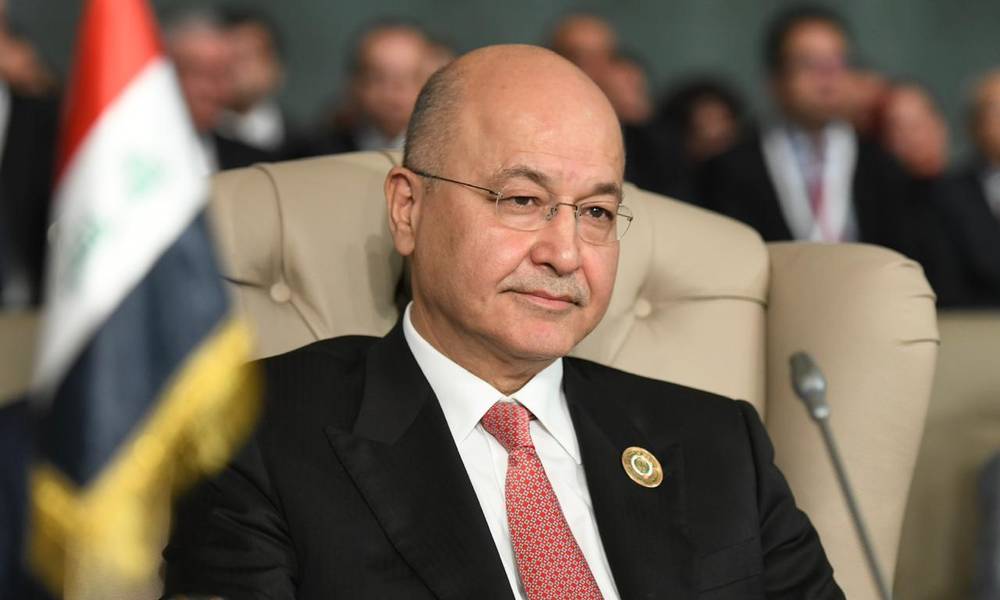The former Iraqi leader had also served as the prime minister of the Kurdistan region between 2009 and 2012 and founded the American University of Iraq, Sulaimani.
Iraq’s former president Barham Salih is scheduled to speak at an upcoming panel in Qatar next week to discuss the deadly 2003 United States invasion of his home country.
Titled ‘The Invasion of Iraq: Regional Reflections’, the event is set to take place between 14-16 September at the Four Seasons Hotel in Doha, under Georgetown University in Qatar’s (GU-Q) ‘Hiwaraat Conference Series’.
The event is expected to bring together a number of scholars, policymakers, diplomats, and government officials from around the world to engage in extensive discussions on global and regional issues.
“I am thrilled to announce the launch of ‘Hiwaraat,’ a thought-provoking series of signature Georgetown events that introduces a fresh, practice-focused format, distinct from traditional academic assemblies. Our mission is to bring together distinguished experts and accomplished practitioners for action-oriented discussions that yield real outcomes,” Dr. Safwan Masri, Dean of GU-Q, said in a press release on Saturday.
The former Iraqi president is participating at the upcoming session on Baghdad as a keynote speaker, where participants will review the US invasion’s impact on Iraq and the rest of the region over the past decades.
Salih served as Iraq’s eighth president from 2018 until 2022 following the Iraqi elections that saw the victory of Kurdish politician Abdul Latif Rashid following a prolonged political deadlock.
The former Iraqi leader also served as the prime minister of the Kurdistan region between 2009 and 2012 and founded the American University of Iraq, Sulaimani.
In April, Salih published an analysis piece on Foreign Policy (FP) titled ‘20 Years After Liberation, Iraq Needs Root-and-Branch Reform’ that delved into Iraq post the US invasion and the collapse of the rule of former president Saddam Hussein.
“Iraq still struggles with deep-rooted problems that stem from decades of political and governance failures. The scars of dictatorship and sectarian violence have not healed. Political deadlock, constitutional disputes, ethnic and religious tensions, poor governance, and rampant corruption plague the country,” Salih penned for FP.
US legacy in Iraq
The US invaded Iraq in 2003 under the former George W. Bush administration’s so-called “war on terror” following the attacks of September 11, 2001.
Bush ordered the full-scale military invasion to destroy alleged ‘Weapons of Mass Destruction’ held by then leader Hussein, though no such weapons were found in the country. Despite this, Iraqi civilians paid the exorbitant cost of America’s crimes.
Between 2003 and 2011, the US carried out horrific war crimes in Iraq, leaving behind a blood-stained legacy in the country.
Evidence of such crimes includes the use of white phosphorus in Fallujah in 2004 by US Marines on Iraqis that triggered an alarming rise in birth defects, infant mortality rates, and cancer cases.
The disturbing findings were first disclosed in a damning report in 2010 by Chris Busby, a British scientist, who studied the health effects of radiation. The report had described the types of cancers among victims as “similar to that in the Hiroshima survivors who were exposed to ionising radiation from the bomb and uranium in the fallout.”
In 2004, shocking photos of US soldiers manning the notorious American-run Abu Ghraib prison surfaced in the media, displaying disturbing evidence of torture in Iraq.
To date, the exact number of civilian casualties in Iraq remains disputed, with the country’s health ministry saying at least 151,000 were killed between 2003 and 2006. Meanwhile,UNICEF said 4-5 million children were made orphans since the US invasion.
Two decades on, the US has yet to publicly and formally apologise for its crimes in Iraq despite numerous evidence and testimonies by soldiers.
Omar Mohammed, historian and founder of Mosul Eye, previously told Doha News that the US did not “have a plan” when they invaded Iraq.
“They didn’t know what they are going to do the next day. They didn’t have any plans,” he said in March during the 2023 Global Security Forum in Doha.







